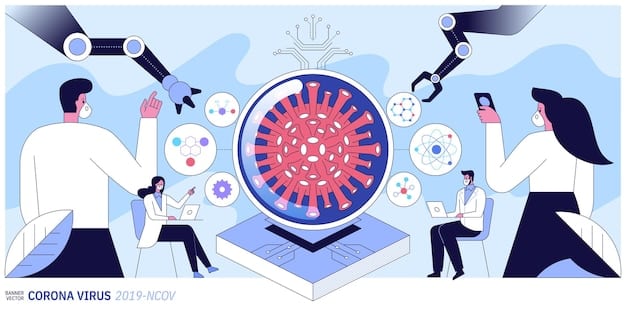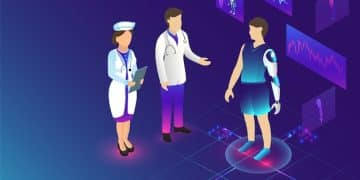AI-Powered Personalized Medicine: Transforming Healthcare in the US

AI-powered personalized medicine is revolutionizing healthcare in the US by tailoring treatments to individual patients based on their unique genetic, environmental, and lifestyle factors, leading to more effective and targeted therapies.
Imagine a world where medical treatments are designed specifically for you, based on your unique genetic makeup. This is the promise of AI-powered personalized medicine: tailoring treatments to individual patients in US, and it’s rapidly becoming a reality.
The Rise of AI in Personalized Medicine
Personalized medicine, also known as precision medicine, aims to deliver the right treatment to the right patient at the right time. AI-powered personalized medicine is the application of artificial intelligence and machine learning to analyze vast amounts of patient data, identifying patterns and predicting treatment outcomes with greater accuracy. This allows healthcare providers to make more informed decisions and develop tailored treatment plans.
The integration of AI in personalized medicine is driven by the increasing availability of genomic data, electronic health records, and wearable sensor data. Machine learning algorithms can process this data more efficiently than humans, uncovering hidden correlations and predicting individual responses to specific therapies.
Benefits of AI-Driven Personalization
AI offers several key advantages in personalized medicine:
- Improved Diagnostic Accuracy: AI algorithms can analyze medical images and data to detect diseases earlier and more accurately.
- Tailored Treatment Plans: AI can predict a patient’s response to different treatments, enabling doctors to choose the most effective option.
- Drug Discovery and Development: AI can accelerate the identification of potential drug targets and optimize drug design.
- Reduced Healthcare Costs: By preventing ineffective treatments and hospital readmissions, AI can help lower healthcare costs.
AI-powered personalized medicine is not a replacement for doctors, but rather a powerful tool that enhances their ability to provide the best possible care. By leveraging AI, healthcare professionals can make more informed decisions and deliver truly personalized treatments.
How AI Analyzes Patient Data for Tailored Treatments
The effectiveness of AI-powered personalized medicine hinges on its ability to analyze complex patient data and extract meaningful insights. This process involves several key steps, from data collection and preprocessing to model training and clinical application.
AI algorithms require vast amounts of data to learn patterns and make accurate predictions. This data can come from a variety of sources, including:
- Genomic Data: DNA sequencing provides information about a patient’s genetic predispositions to certain diseases and their potential response to specific medications.
- Electronic Health Records (EHRs): EHRs contain a comprehensive record of a patient’s medical history, including diagnoses, medications, treatment plans, and lab results.
- Imaging Data: Medical images, such as X-rays, MRIs, and CT scans, can be analyzed by AI algorithms to detect abnormalities and track disease progression.
- Wearable Sensor Data: Wearable devices, such as fitness trackers and smartwatches, can collect real-time data on a patient’s physical activity, sleep patterns, and vital signs.

The data collected from these sources is often messy and incomplete. AI algorithms require clean, standardized data to function effectively. Data preprocessing involves several steps, including:
Data Preprocessing and Model Training
Data preprocessing and model training are crucial for AI algorithms.
- Data Cleaning: Removing errors, inconsistencies, and missing values from the data.
- Data Integration: Combining data from different sources into a unified format.
- Data Transformation: Converting data into a format that is suitable for machine learning algorithms.
After the data has been preprocessed, it is used to train machine learning models. Model training involves feeding the algorithm large amounts of data and allowing it to learn the relationships between different variables.
Once the model has been trained, it can be used to make predictions about individual patients. For example, the model could predict the likelihood that a patient will respond to a particular drug or develop a specific disease.
Applications of AI in Personalized Cancer Treatment
Cancer is a complex disease with many different subtypes, each requiring a unique treatment approach. AI-powered personalized medicine is revolutionizing cancer care by enabling doctors to tailor treatments to the specific characteristics of each patient’s tumor.
AI algorithms can analyze genomic data to identify specific mutations that are driving a patient’s cancer. This information can be used to select targeted therapies that specifically attack the cancer cells while sparing healthy cells.
AI for Targeted Cancer Therapies
AI’s role in targeted therapies is multifaceted.
- Drug Repurposing: AI can analyze existing drug databases to identify drugs that may be effective against specific cancer mutations.
- Predicting Treatment Response: AI can predict which patients are most likely to respond to a particular targeted therapy.
- Monitoring Treatment Effectiveness: AI can analyze medical images and lab results to track the effectiveness of treatment and detect early signs of resistance.
AI is also being used to develop personalized cancer vaccines. These vaccines are designed to stimulate a patient’s immune system to attack their cancer cells.
AI algorithms can analyze genomic data to identify unique antigens on the surface of cancer cells. These antigens are then used to create a personalized vaccine that targets the patient’s specific cancer cells.

Ethical Considerations and Challenges
While AI-powered personalized medicine holds immense promise, it also raises important ethical considerations and challenges. These issues must be addressed to ensure that AI is used responsibly and equitably in healthcare.
One of the primary concerns is data privacy. AI algorithms require access to vast amounts of patient data, which raises concerns about the security and confidentiality of this information.
Addressing Data Privacy and Bias Concerns
Data privacy and bias are critical aspects in AI and healthcare.
- Data Security: Implementing robust security measures to protect patient data from unauthorized access and cyberattacks.
- Data Anonymization: Using techniques to remove personally identifiable information from data before it is used to train AI algorithms.
- Data Governance: Establishing clear policies and procedures for the collection, storage, and use of patient data.
Another challenge is algorithmic bias. AI algorithms are trained on data, and if that data is biased, the algorithm will also be biased. This can lead to disparities in healthcare outcomes for different groups of patients.
Algorithmic bias can be mitigated by using diverse and representative datasets to train AI algorithms and by carefully monitoring the performance of algorithms across different demographic groups.
The Future of AI-Powered Personalized Medicine in the US
AI-powered personalized medicine is poised to transform healthcare in the US, leading to more effective, efficient, and equitable care. As AI technology continues to advance, we can expect to see even more innovative applications of AI in personalized medicine.
One promising area is the development of AI-powered diagnostic tools. These tools could be used to screen patients for diseases early on, when they are most treatable.
Future Trends and Innovations
Future trends and innovations are expected to shape AI in medicine.
- AI-Powered Drug Discovery: Accelerating the identification of new drug targets and optimizing drug design.
- Remote Patient Monitoring: Using wearable sensors and AI algorithms to monitor patients remotely and detect early signs of deterioration.
- Virtual Healthcare Assistants: Providing patients with personalized support and guidance through virtual assistants powered by AI.
The widespread adoption of AI-powered personalized medicine will require collaboration between healthcare providers, technology companies, and regulatory agencies. It will also require a commitment to addressing the ethical considerations and challenges associated with AI.
By working together, we can harness the power of AI to create a future where healthcare is truly personalized and tailored to the unique needs of each patient.
Real-World Examples of AI in Personalized Medicine
The practical applications of AI-powered personalized medicine are rapidly expanding, with numerous examples demonstrating its potential to improve patient outcomes. Let’s explore some real-world scenarios where AI is making a tangible difference.
In oncology, AI is being used to analyze tumor genomes and identify personalized treatment strategies. For instance, AI algorithms can predict a patient’s response to specific chemotherapy regimens based on their genetic profile, helping oncologists choose the most effective treatment plan.
AI is also used to manage chronic conditions such as diabetes. AI-powered apps can monitor patients’ blood sugar levels, track their dietary habits, and provide personalized recommendations to help them manage their condition more effectively.
These examples highlight the diverse applications of AI in personalized medicine, from improving diagnostic accuracy to optimizing treatment strategies and empowering patients to better manage their health.
| Key Point | Brief Description |
|---|---|
| 🧬 Genomic Analysis | AI analyzes DNA to tailor treatments. |
| 📈 EHR Integration | AI uses health records for precise care. |
| 🤖 AI Diagnostics | Early & accurate disease detection. |
| 🛡️ Ethical Concerns | Data privacy and bias are addressed. |
FAQ
▼
AI-powered personalized medicine uses artificial intelligence to analyze individual patient data, like genetics and lifestyle, to tailor specific treatments that are more effective.
▼
AI algorithms process large amounts of data to detect patterns and predict treatment outcomes, leading to more precise diagnostic and therapeutic decisions by healthcare providers.
▼
Data includes genomic information, electronic health records, medical imaging, and wearable sensor data, providing a comprehensive view of a patient’s health profile.
▼
Ethical concerns include safeguarding patient data privacy, addressing algorithmic bias, and ensuring fair access to personalized treatments across diverse populations.
▼
The future involves broader implementation, AI-driven drug discovery, remote patient monitoring, and virtual healthcare assistants, offering more efficient, equitable, and proactive healthcare solutions.
Conclusion
AI-powered personalized medicine represents a monumental leap forward in healthcare, promising to deliver treatments specifically designed for each patient’s unique characteristics. As technology advances and ethical considerations are carefully addressed, the widespread adoption of AI in personalized medicine holds the potential to revolutionize healthcare in the US, leading to improved outcomes, reduced costs, and a more equitable healthcare system.





